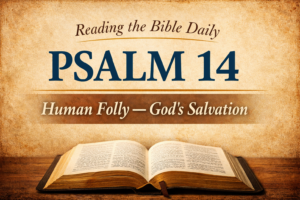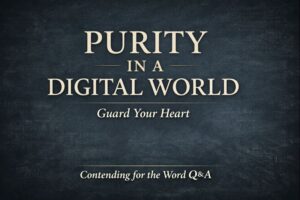⏱️ Estimated Reading Time: 9 min read
“Be pleased, O LORD, to deliver me! O LORD, make haste to help me!”[i]
“In my distress I called upon the LORD; to my God I cried for help.”[ii]
“Hear, O LORD, when I cry aloud….”[iii]
‘Hear the voice of my pleas for mercy, when I cry to you for help….”[iv]
“Hear my prayer, O LORD, and give ear to my cry; hold not your peace at my tears!”[v]
Can you relate to these pleas? Humans are sufferers. Life is not the way it is supposed to be. Life on planet Earth is often broken as we seek times of peace. Sin that originated in the Garden has affected everything. Often relationships are strained and loved ones die. Scripture is brutally honest about all of this, and so our gracious God gives us an outlet: the gift of lament before the throne of the Almighty. But what does it mean? Lament can be defined as, “a crying out in grief”, “to express sorrow”, “to mourn aloud”.[vi]
Humans were not made to bear life alone, but to be in relationship to our Creator. So, cry out to him in your time of need (Hebrews 4:15-16). Crying out to the Lord is modeled for us by the writers of Scripture and encouraged by the LORD. This has many implications. There is actually a whole book about lamenting called Lamentations, written by the “weeping prophet”, Jeremiah. So remember in your anguish that you are not alone. Many have felt the heart-wrenching pain and have modeled for you how to turn to your Creator. What a privilege and how kind of our Lord!
Allow me to take you to a personal favorite of proper lament. Psalms 42 and 43 are beautiful yet heart-wrenching examples of lament in times of intense pain.[vii] The anguish can be felt as you read the questions that come from the soul of this son of Korah.
Proper Lament Remembers
The writer says, “These things I remember, as I pour out my soul…” (Psalm 42:4). The Psalmist is reflecting on how worship used to be. What are you remembering? A birthday? Christmas the way it used to be? An anniversary that stirs memories in your mind?
I am writing this on my brother’s birthday. My brother died “prematurely” from a massive heart attack a few years ago at age 52. Unfortunately, this was the culmination of a sad life. I am remembering and reflecting. My brother’s life has raised many “why” questions for me, and this is modeled for us in these Psalms as well. The Psalmist not only reflects but also asks questions.
Proper Lament Can Ask “Why?”
“I say to God, my rock: why have you forgotten me? Why do I go mourning because of the oppression of the enemy?” (Psalm 42:9). The writer believes he is experiencing abandonment by none other than God! Have you thought that? Where is God in the midst of this pain? Am I being punished? Why does the Lord seem silent? These are questions the Psalmists ask repeatedly, and they are common to humans.
A number of years ago I was involved in counseling after the Virginia Tech University massacre where 32 people were killed, and 17 others were wounded. As we counseled hundreds we were asked repeatedly, “Why Blacksburg?” “Why is my friend dead but I’m not?” “Why here?” “Why now?”
The famous pastor Charles Spurgeon also wrestled with this. In his Treasury of David he wrote, “Faith is allowed to enquire of her God the causes of his displeasure, and she is even permitted to expostulate with him and put him in mind of his promises, and ask why apparently they are not fulfilled. If the Lord indeed be our refuge, when we find no refuge, it is time to be raising the question, ‘why is this?’”[viii]
Many would say it is not proper to ask “why” questions of God. However, I would argue that has to be wrong since the ultimate author of these Psalms is God Himself. He is helping the author articulate his pain. We believe that God guides the writers of Scripture and gives them the very words to write. In other words, the Lord is helping him articulate his pain. And even our Lord Himself moaned on the cross, “My God, My God, Why have you forsaken me?” (Matthew 27:46). Have you learned how to ask “why?” properly? He does not stop with “why?” though. As he laments he remembers who God is and this comforts the soul.
Proper Lament Remembers There Is a God Who Is Real
The hero of this Psalm is actually the God of the universe. It would be easy to get lost in the sadness and the pathos of the Psalm and not see that in 16 verses there are at least 17 truths about who God is! He is the living God (Psalm 42:1) of “steadfast love” (Psalm 42:8), and the One who gives songs in the night (Psalm 42:8). He is our “rock” in the midst of turmoil (Psalm 42:9). He is the God of justice (43:1). In other words, those who have hurt you will be held accountable. We are also blessed that in the darkness He sends out “light” and “truth” (Psalm 43:3). There are many other statements about who the LORD is beyond these.
This lamenter has a robust view of God. In the midst of your sorrow, do you remember there is a living God? There is nothing like pain and anguish to reveal the true depth of your belief system. Have you stored up good theology for times of affliction and questioning? Are you disciplining yourself to remember truth about the character of your Lord?
Proper Lament Clings to the Promise That There is Always Hope
Years ago, Jerry Bridges defined a life of trust this way: “Trust is not a passive state of mind. It is a vigorous act of the soul by which we choose to lay hold on the promises of God and cling to them despite the adversity that at times seeks to overwhelm us.”[ix] The writer does this as he fights with his soul to remember there is a future. “Why are you cast down, O my soul, and why are you in turmoil within me? Hope in God; for I shall again praise Him…” (Psalm 42:5).[x] Even if the near future looks bleak there is always an eternal future so “let your gaze break through to eternity”.[xi] The rest of life on the planet may seem unbearable, but discipline your mind that heaven is real and someday (sooner than you think) all tears will be gone.
He not only clings to this promise, but all through these Psalms it is evident he practices telling his soul other truths as well. This is shown when he calls the LORD “my God” in numerous places, “My rock” (Psalm 42:9), and he is the “refuge” (Psalm 43:2). There are many truths he is repeating to his hurting soul.
Please note that putting into practice Bridges’ definition of trust is different from reciting the Bible to yourself or even repeating a verse repeatedly in your head. This would be treating Bible verses as if they are mere mantras. In reality, it is fighting with your soul to choose to believe truth in the midst of chaos. It can happen the first time you remind your soul of truth if you tell your soul you believe it. However, it will probably mean that 2 minutes later you have to do it again. Are you fighting with your soul to believe truth? How are you doing believing there is a future? This all sounds good in theory, but how do you do it?
Practical Ideas for Practicing Lament
How about following the pattern of this Psalm and pray your own lament back to the Lord. In other words, put the details of your sorrows and questions into the Psalm. A variation of this idea would be to write out your own lament Psalm to the Lord. If you are like me, sometimes I do not even know what to say to the Lord because I am hurting so much. Let this Psalm or another lament Psalm guide your written prayer and help you articulate your pain. Try walking and lamenting, or getting on your knees as you lament. Go back through these two chapters and find as many attributes of God as possible. Then, pray them back to the Lord and thank Him for who he is in the midst of your pain. Memorize Jerry Bridges’ definition of trust and choose some of the promises of Scripture to fight with your soul to believe and cling to in the midst of the darkness.
Closing Prayer
Father, You are intimately acquainted with all of our ways, so You know the ones who are reading this. May each learn to walk closely with You in the midst of suffering. Help us as we practice proper lamenting before You. Please give us strength to fight with our souls to remember Your character and other rich promises of Scripture. We all thank You for the gift of lament and that we do not need to walk through life alone. We come before You in the name of the One who understands pain and suffering. Amen.
[i] Psalm 40:13 (All quotes from Scripture are from The English Standard Version).
[ii] Psalm 18:6
[iii] Psalm 27:7
[iv] Psalm 28:2
[v] Psalm 39:12
[vi] Merriam Webster on-line dictionary, “Lament.” Accessed Nov. 16, 2018.
[vii] These Psalms were probably originally one as indicated by chapter 43 not having a heading but all other Psalms in this section do. In addition, both Psalms follow the same format and theme.
[viii] Charles Spurgeon, The Treasury of David, Vol. 1 (McLean, VA: MacDonald Publishing Company, year not listed), 274.
[ix] Jerry Bridges, Trusting God, Even when Life Hurts, (Colorado Springs, CO: NavPress, 2008) 214.
[x] See also verse 11 and 43:5
[xi] This a phrase I read many years ago but do not remember the book.
Ernie serves as the Pastor of Counseling and Discipleship and the director of the Grace Center for Biblical Counseling at First Baptist Church in Jacksonville, Florida. In addition, he is the Chair of the online degree in Biblical Counseling at The Master’s University and author of Marry Wisely, Marry Well.




